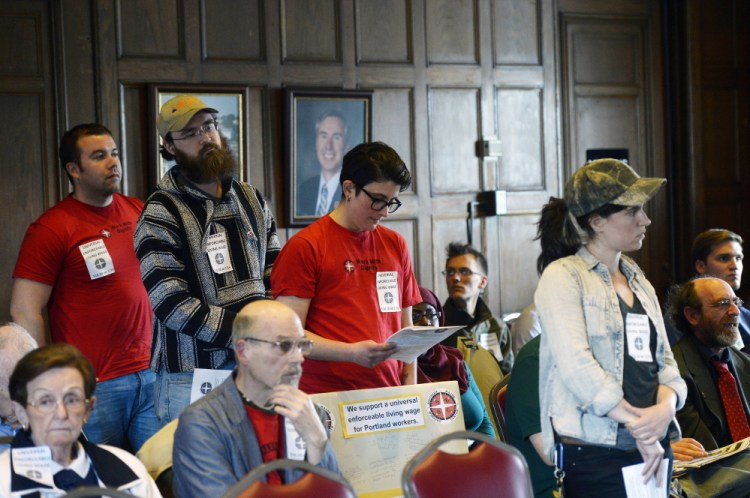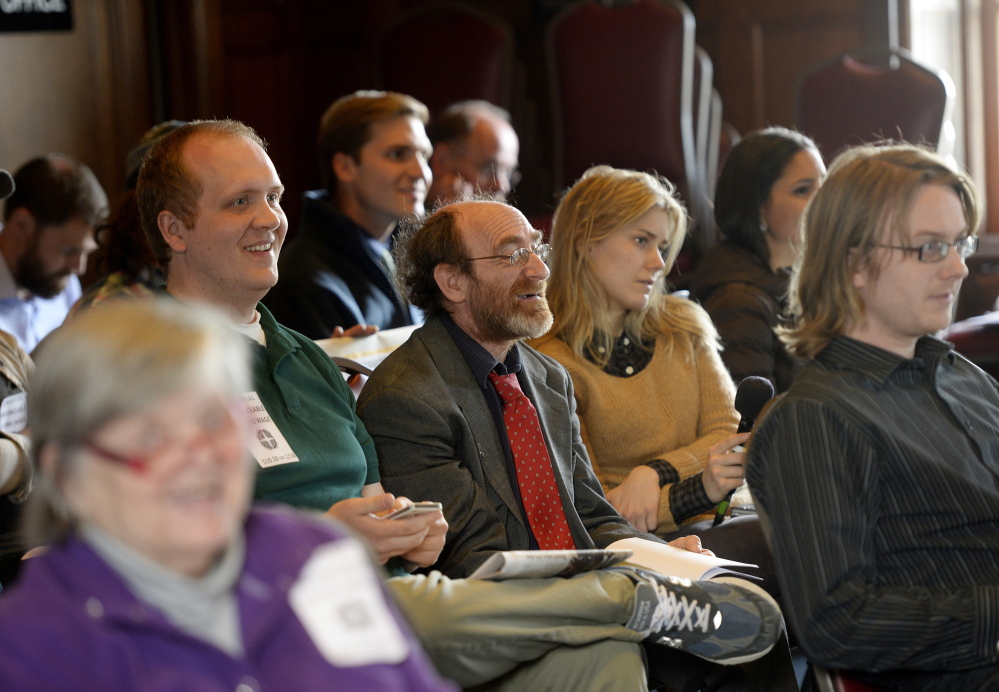A City Council committee on Thursday voted 3-0 to create a citywide minimum wage in Portland.
If passed by the full council, Portland would become the first city in the state and the 12th nationally to create its own minimum wage, according to the National Employment Law Project, a New York City nonprofit tracking the issue.
But the proposal recommended by the Finance Committee is substantially scaled down from the one originally proposed by Mayor Michael Brennan, who called for a citywide minimum wage in early 2014.
Brennan, who developed his proposal with the help of a committee of businesses and residents, proposed a minimum wage of $9.50 an hour starting July 1. It would have increased to $10.10 an hour on Jan. 1, 2016, and $10.68 on Jan. 1, 2017. Annual cost-of-living adjustments would have followed every Jan. 1.
Instead, the committee reduced the proposed wage from $9.50 an hour to $8.75, doubled the amount of time for future increases, removed a provision to tie future increases to the consumer price index and excluded tipped workers from the raise.
Even so, the proposed wages are significantly higher than the current state minimum wage of $7.50 an hour.
“I come from a labor background,” said Councilor Nicholas Mavodones, who chairs the committee. “I’d love to be able to support a higher number, but there is a balance here.”
Part of that balance was eliminating tipped workers from the ordinance to quell opposition from restaurant owners, who argued that servers are their highest earning employees. Steve DiMillo, owner of DiMillo’s on the Water, said that including tipped workers would cost him $73,000 a year.
The changes, suggested by Councilor Jill Duson, were approved by a 2-1 vote, with Councilor Jon Hinck opposed. Councilor Edward Suslovic was in Russia and unable to attend the meeting.
“I definitely care about working mothers,” said Duson, acknowledging that most minimum wage earners are women. “But I also care about small businesses working on the margins.”
Portland would investigate any complaints about businesses failing to comply with the ordinance and aggrieved workers could sue their employer for unpaid wages and reasonable attorneys fees.
The committee vote comes as the Portland Green Independent Committee is collecting signatures for a citywide referendum in November that would establish a mandatory livable wage of $15 an hour in Portland.
Also on Thursday, the progressive Maine People’s Alliance announced that it was gathering signatures for a 2016 state referendum that would create a statewide minimum wage of $12 an hour by 2020.
Increasing the minimum wage has emerged as a key political issue for Democrats at the federal, state and local level over the last year or so. President Obama signed an executive order last year that would pay federal employees and contractors a minimum wage of $10.10 an hour. He called on Congress to follow suit for all workers, raising the federal minimum from $7.25 an hour.
Brennan’s proposal was supported Thursday by progressive and pro-labor groups such as Portland Green Independent Committee, Southern Maine Workers Center, Maine People’s Alliance, Maine Women’s Lobby and AFL-CIO, but was opposed by business groups, such as the Portland Community Chamber and the Maine Restaurant Association.
Proponents encouraged the council to adopt a higher, living wage, while opponents said the wage should be raised at the state and federal levels to prevent the city from becoming an outlier.
Things got a little testy during the nearly 90-minute public hearing. John Newton, of the Maine AFL-CIO, decried Wall Street and the top 1 percent of wage earners in the United States, and called the Portland Community Chamber “hostile to working people” for opposing the ordinance.
The Maine Restaurant Association and Maine Innkeepers Association shot back. “It really concerns me when the tactics of Big Labor are used to attack small businesses,” said Chris Jones, the chief operating officer of both groups. “We’re hearing things like Wall Street bonuses and wealth at the top and corporations – I don’t see any of those around here. I see a lot of small businesses.”
It’s exactly those small businesses – many of which want to do the right thing and pay their employees fair wages – that are caught in the middle.
Matt Bolinder, co-owner of the Speckled Axe on Congress Street, which pays higher than the state minimum wage, spoke in support of the ordinance. He became emotional when talking about the long hours he puts in to make ends meet and how increasing wages for his workers is worth increases in his prices.
However, his voice shook and he had to pause to control himself when he acknowledged the “uncertainty and real risk” associated with the ordinance.
“I am hopeful that my wonderful customers and the customers of other retailers whose prices will inevitably increase will choose to continue to support the small businesses that comprise the local economy,” Bolinder said.
After the meeting, Brennan said he was pleased the proposal will go to the council after months of delays.
“I will be working with the council to make sure we pass something,” he said. “We want to do something that is substantial and makes a difference in people’s lives.”
Send questions/comments to the editors.





Success. Please wait for the page to reload. If the page does not reload within 5 seconds, please refresh the page.
Enter your email and password to access comments.
Hi, to comment on stories you must . This profile is in addition to your subscription and website login.
Already have a commenting profile? .
Invalid username/password.
Please check your email to confirm and complete your registration.
Only subscribers are eligible to post comments. Please subscribe or login first for digital access. Here’s why.
Use the form below to reset your password. When you've submitted your account email, we will send an email with a reset code.